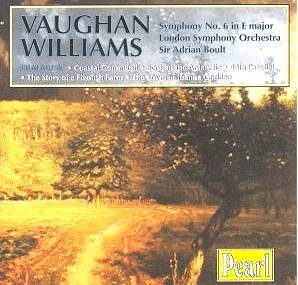The Fourth and Sixth Symphonies stand as brothers gazing
at each other across the divide marked by the Second World War. Both
are turbulent, even violent, works. Both are troubled and both have
supple melodic material in emphatic contrast with the furious or bleak
throes that surrounds that material. Neither Symphony was written during
the war and Vaughan Williams rejected prying suggestions that these
works were some wraith of recent international conflicts. Ironically
or fittingly the Fifth has a surface and effect that is the most peaceful
of the nine alongside the elegiac pastorals of the much under-rated
Third.
Boult was by many accounts a fiery individual and something
of his temper adds vitality to this, the first ever, recording of the
Sixth Symphony. Roger Beardsley has wrought carefully here. The sound
quality is excellent for the time as pointed out in the liner notes.
The recording travelled as an ambassador for British music across the
world and made good progress in the States winning many friends. Notable
is the pummelling violence and marine yearning of the first movement
and the haunted plutonic epilogue-finale with its Holstian echoes (Neptune)
and its lessons learnt from Bax's Sixth Symphony. The Bax also ends
in an all-passions drained epilogue although his is a retreat to glistening
enchantment rather than Vaughan Williams' concentrated, subdued, cold
and world-weary exhaustion. This recording must be counted in the same
company as the RVW directed Fourth Symphony. The scherzo is the original
one before the composer's rescoring.
The film music extracts are from the 1940s - part of
the composer's war work. Scott of the Antarctic is in fact a
post-War film. Its use of colour and authentic locations made quite
a splash at the time enhanced by the music here transferred from a double-sided
Plum label 78. The music is well enough known now but hearing the ingenious
use of percussion and the imaginative vocalising by solo soprano (who
was she, please?) and by choir this reinforces the evidence that some
composers feel greater freedom to experiment in the cinema rather than
in the concert hall. The Coastal Command and Flemish Farm
tracks are taken from rare BBC discs of the BBC Northern Orchestra
(no 'Symphony' in its title in those days) conducted by Muir Mathieson.
Coastal Command tends to blandness in the rum-ti-tum Prelude
but improves with the section depicting the flying boat going in close
to the German raider. It is better encountered in an extended suite
on a Cloud Nine CD of British film music. The Dawn Scene from
The Story of a Flemish Farm, with its prominent role for solo
violin, is poignantly done and is all the more affecting for the later
doom-laden climax prophetic of the plot which involves sacrifice and
death in Occupied Belgium. Unused 'chips' from this score found their
way into the Sixth Symphony. The epilogue from 49th Parallel
is quite another matter. This, with its broad stretching romantic
epic theme, ascends the same heights as his best concert music of those
years. The Joanna Godden scenes are presented in two groups each
with a single track of about four and a half minutes. In general this
music is soft and unemphatic. Scenes such as Martin drowned at Dungeness
and Burning of the sheep have more grit and atmosphere. Several
times I thought the music was more in keeping with the threatening Dickensian
mists of another marshland - the desolation in which Pip encounters
Magwitch.
This is an extremely valuable disc for Vaughan Williams
collectors. Never have so many rare vintage film tracks been gathered
together. The Symphony is probably in many collections in one of its
EMI issues - most desirably the one which includes both the original
and the revised scherzo. For the rest you will not find a better way
of gaining a still vivid insight into the raw experience of hearing
the film scores in their authentic 1940s colours.
Good notes by Lewis Foreman and Roger Beardsley. Sound:
mono, of course - surface noise but with clicks and ticks neatly purged.
Rob Barnett


